
Nikolai Konstantinovich Rerikh, better known as Nicholas Roerich, was a Russian painter, writer, archaeologist, theosophist, philosopher, and public figure. In his youth he was influenced by Russian Symbolism, a movement in Russian society centered on the spiritual. He was interested in hypnosis and other spiritual practices and his paintings are said to have hypnotic expression.
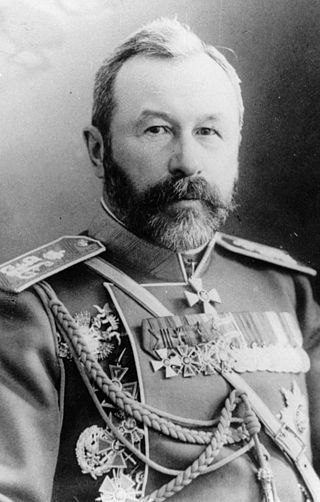
Aleksey Nikolayevich Kuropatkin served as the Russian Imperial Minister of War from January 1898 to February 1904 and as a field commander subsequently. Historians often hold him responsible for major Russian defeats in the Russo-Japanese War of 1904 to 1905, most notably at the Battle of Mukden (1905) and at the Battle of Liaoyang.

Nikolay Mikhaylovich Przhevalsky was a Russian geographer of Polish descent, and a renowned explorer of Central and East Asia.
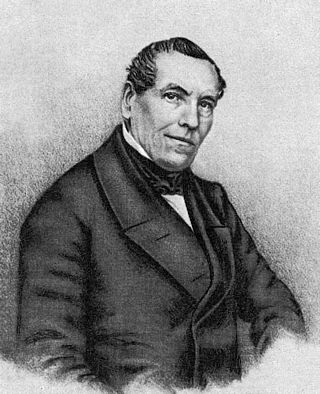
Édouard Ménétries was a French entomologist, zoologist, and herpetologist. He is best known as the founder of the Russian Entomological Society.
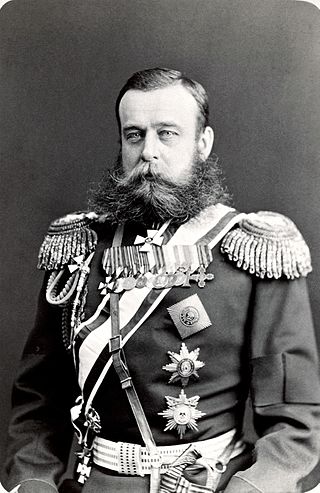
Mikhail Dmitriyevich Skobelev, a Russian general, became famous for his conquest of Central Asia and for his heroism during the Russo-Turkish War of 1877–1878. Dressed in a white uniform and mounted on a white horse, and always in the thickest of the fray, he was known and adored by his soldiers as the "White General". During a campaign in Khiva, his Turkmen opponents called him goz ganly or "Bloody Eyes".

Mikhail Vasilyevich Alekseyev was an Imperial Russian Army general during World War I and the Russian Civil War. Between 1915 and 1917 he served as Tsar Nicholas II's Chief of Staff of the Stavka, and after the February Revolution, was its commander-in-chief under the Russian Provisional Government from March to May 1917. He later played a principal role in founding the Volunteer Army in the Russian Civil War and died in 1918 of heart failure while fighting the Bolsheviks in the Volga region.
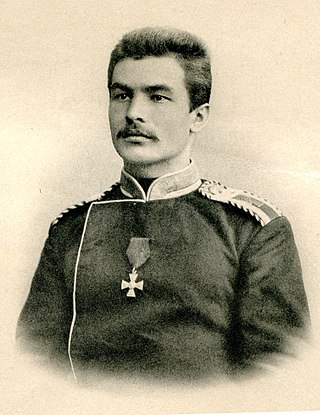
Pyotr Kuzmich Kozlov was a Russian and Soviet traveller and explorer who continued the studies of Nikolai Przhevalsky in Mongolia and Tibet.

Mikhail Grigoryevich Chernyaev was a Russian major general, who, together with Konstantin Kaufman and Mikhail Skobelev, directed the Russian conquest of Central Asia during the reign of Tsar Alexander II.

Eduard Gustav Freiherr von Toll, better known in Russia as Eduard Vasilyevich Toll and often referred to as Baron von Toll, was a Russian geologist and Arctic explorer. He is most notable for leading the Russian polar expedition of 1900–1902 in search of the legendary Sannikov Land, a phantom island purported to lie off Russia's Arctic coast. During the expedition, Toll and a small party of explorers disappeared from Bennett Island, and their fate remains unknown to this day.

The Russian Geographical Society, or RGO, is a learned society based in Saint Petersburg, Russia. It promotes geography, exploration and nature protection with research programs in fields including oceanography, ethnography, ecology and statistics.

Bronislav Ludwigovich Grombchevsky was an ethnic Polish officer in the Imperial Russian Army and an explorer/spy, famed for his participation in The Great Game.

The General Staff Academy was a Russian military academy, established in 1832 in St.Petersburg. It was first known as the Imperial Military Academy, then in 1855 it was renamed Nicholas General Staff Academy and in 1909 - Imperial Nicholas Military Academy.

Sergey Fyodorovich Oldenburg was a Russian orientalist who specialized in Buddhist studies. He was a disciple of Ivan Minayev, the founder of Russian Indology.

Nikolai Nikolaevich Kolomeitsev, also spelt Kolomeytsev was a naval officer of the Russian Empire and Arctic explorer.

Samuil Martynovich Dudin was an ethnographer, photographer, artist and explorer. He was a founder of the Ethnographical Department of the Russian Museum in St. Petersburg and a member of several expeditions.

Sergei Mihailovich Dukhovskoi (1838–1901) was a Russian military officer who served, among other things, as Priamur and Turkestan Governor General Ataman of the Priamur Cossack host.
Mikhail Venyukov was a Russian geographer and Major General.
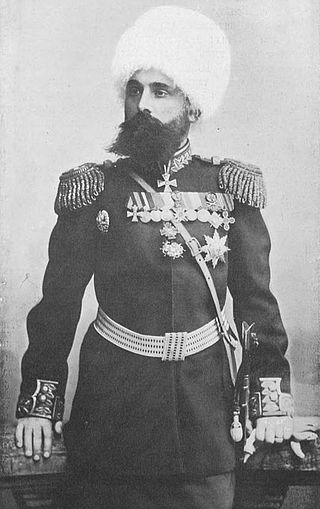
Dejan Ivanovich Subotich was a Russo-Serbian military and state leader, military governor of Russian Dalian ;Transcaspian Oblast, general governor of Primorsky Krai (1902-1903), Military ataman of the Ussuri Cossack Host, Governor General of Amur Oblast (1903-1905) and Turkestan (1905-1906).

Mikhail Stepanovich Andreyev was a Russian-Uzbek and Soviet orientalist, cultural researcher of Central Asia, ethnographer, linguist, and archaeologist. He was initially supervised by Vladimir Nalivkin, and was the teacher of Olga Alexandrovna Sukhareva. He was a corresponding member of the Russian Academy of Sciences.

Vsevolod Ivanovich Roborovsky was a Russian army officer, explorer, artist, and natural history collector in central Asia. Many species were described on the basis of the specimens he collected and several are named after him including Phodopus roborowskii, Carpodacus roborowskii, Adiantum roborowskii, and Cacalia roborowskii.




















